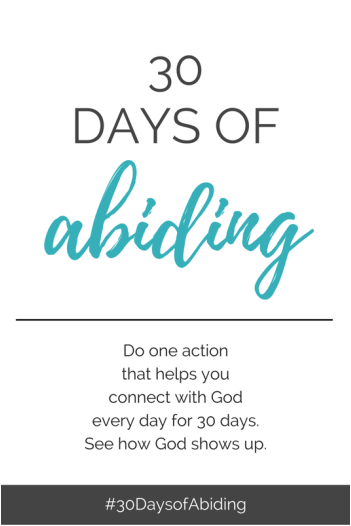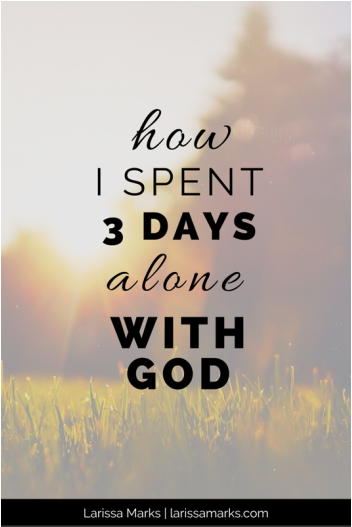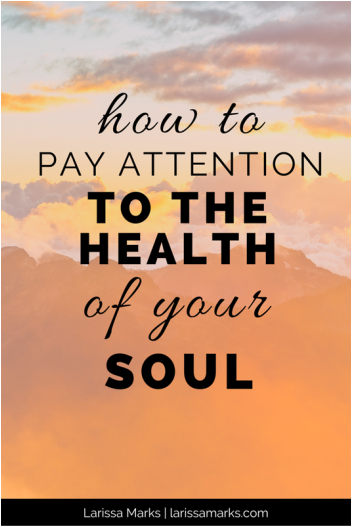|
For the last month, I did 30 Days of Abiding. My intention was to create just a small bit of space to encounter God daily, and go deeper in my relationship with him. So each day I took time to go through the Daily Examen with God. Here are 7 things I learned as I did 30 days of the Daily Examen: 1. Doing anything for 30 days is difficult. In all honesty, there were a few days when I either completely forgot about the Examen, or simply could not make space in the day. My daily life has a general flow to them, but there were a few circumstances that made it a challenge to do the Examen every day. For example, some nights we hosted people at our home, and I was unable to find the time or energy to do the Examen. This was a little frustrating. The perfectionist in me didn't like having days when I didn't accomplish what I had set out to do. But I also experienced moments of grace from God. Ultimately, I felt like despite the missed days, my heart was in a good place of wanting more union with God. 2. The Daily Examen is a wonderful pathway to connect with God. I love how the Daily Examen deepened my awareness of my soul and God's presence. With each additional time of doing the Examen, I began to be more generally aware of how God was at work in my daily life. I began to expect to see God or hear God in the midst of typically mundane activities and moments. At night, when I did the Examen, I loved noticing how God had been speaking to my soul through my joys and sorrows. 3. Community is vital for my spiritual growth. I really experienced the gift of community this month. I originally meant to simply do the 30 Days of Abiding on my own. But then I ended up inviting others along into it. We launched the Spiritual Journeyers Facebook Group, and many people in the community joined 30 Days of Abiding. Every day, people shared encouragement, prayer requests, and reflections throughout the 30 days. What a fun, encouraging thing it was to pursue a common desire for God with others! 4. Spiritual growth is a mysterious combination of me showing up and God doing his work. I believe that my depth with God grew this month. I experienced new awareness of God, and a deeper contentment in my soul with him. Did I do a whole lot? On some level, yes. I showed up. I intentionally created more space in my daily life to turn toward God. But the true work in me ultimately happened because of God. His Spirit birthed in me a deeper desire for him, a deeper trust in his power and presence. Both of those things - me showing up and God showing up - create the environment for true spiritual growth. It is the promise of Jesus in John 15: "Abide in me, and I in you. As the branch cannot bear fruit of itself unless it abides in the vine, so neither can you unless you abide in me. I am the vine, you are the branches; he who abides in me and I in him, he bears much fruit, for apart from me you can do nothing." What have you learned as you've create space to connect with God in your daily life? Please share in the comments. If you enjoyed this post, check out these related posts: How to Connect With God Through the Ignatian Examen Prayer Questions That Lead Us to Transformation Want guidance and inspiration for your spiritual journey delivered to your inbox? Sign up for my email newsletter Notes From Larissa. I recently had a three-day personal prayer retreat. For years, I have taken 1-2 prayer retreats every year, and they have become a foundational element in my spiritual growth and relationship with God. If you're wondering more about my personal prayer retreat, read on. Where did I spend my prayer retreat? My prayer retreat was at the Benedictine Monastery of Hawaii. Like many other Catholic retreat centers, the monastery hosts guests for retreats for a very reasonable fee. I paid $50 per night, which included a private bedroom and bathroom, as well as meals served in the dining hall. The Benedictines are the oldest religious order of the Catholic Church, and practice communal worship and prayer three times a day. What did I bring with me? I had a journal, Bible, my Retreat Guide and Life Reflection, and a few books (Strengthening the Soul of Your Leadership: Seeking God in the Crucible of Ministry by Ruth Haley Barton and The Color of Secrets by Lindsay Jayne Ashford). I find that one spiritual book and one novel is a good amount of content to consume. If I bring no books, I feel aimless; if I bring too many books, I feel overwhelmed. What happened during my prayer retreat? Even though I am not Catholic, I was graciously welcomed and encouraged into participating in the community practices by the monks. As an outsider, I observed how the daily communal prayer and mealtimes created built-in rhythms for everyone together. It was a gift to have these rhythms as part of our schedule. Outside of the three daily times of communal worship and prayer with the Benedictine monks, I spent the rest of my time alone. I view these retreats as space to connect with God, retreat from daily life, and allow my soul to be refreshed. Here are the main things that happened during my retreat: Reflection with God During the first few hours of my retreat, I read through my Retreat Guide, and spent time in reflective prayer. I allowed my soul to settle in, and shared with God about what I hoped for. I asked him to say and do whatever he wanted during the retreat. This invitation is a simple yet crucial transaction between God and myself. I struggle with wanting to control these prayer retreats, so submitting the three days to God’s agenda is a good discipline for me. I did this Life Reflection, which is an exercise of a few simple questions that helped me to step back and consider the present reality of my life, soul, and spiritual health. Throughout the prayer retreat, I paused and asked God to speak to me. Whenever I sensed God speaking, I wrote those things down in my journal. There were a few words, Scriptures, and images I received from God. There were also several moments when I felt drawn to read Strengthening the Soul of Your Leadership: Seeking God in the Crucible of Ministry, and was prompted at various points of reading to dialogue with God. For example, in the book the author talks about creating rhythms of Sabbath in community. I realized that although I want to practice a consistent Sabbath, I truly have no idea how to practically do that within our family life. I asked God for insight and wisdom in this area of my life, and sensed that he will give direction as I discuss this with my husband. Solitude and Silence For me, solitude and silence feel both refreshing and uncomfortable. I believe the discomfort occurs not simply because I am used to more noise and activity, but also because my soul enjoys being distracted. When I fill my life with social media, activities, and other voices, I can ignore the subtle places of loneliness that my soul experiences. If it is simply me sitting quietly with God, there’s no place to run and hide. If I allow myself to enter into the solitude and silence, my soul begins to enjoy the quiet. The weight and burden of needing to have words or social energy for other people starts to lift off my shoulders. There is freedom to simply be God's child, and rest in the still presence of my Father. Sleep and Rest After several prayer retreats like this, I have come to expect that a big portion of my time will be spent sleeping. In my normal daily life, naps feel like rare luxuries. I am constantly on the go, pushing through tiredness to get things done. I’m usually unaware of how exhausted I am until I have the space and permission to deeply rest. Did you know that God ministers to us by allowing us to sleep? Prayer retreats give me a chance to switch to “off” for a while. On each day of my retreat, I took 2 long naps, and slept for a full 8 hours at night. My body needed this restorative sleep time from God. Beyond sleeping, my body was allowed to rest. I moved slowly, without having to jump from activity to activity. I sat around a lot, being more attentive to sights and sounds around me that I normally miss. Are you tired? Worn out? Burned out on religion? Come to me. Get away with me and you’ll recover your life. I’ll show you how to take a real rest. Walk with me and work with me—watch how I do it. Learn the unforced rhythms of grace. I won’t lay anything heavy or ill-fitting on you. Keep company with me and you’ll learn to live freely and lightly.” My prayer retreat can be summed up in the promise from Jesus above, “Come to me. Get away with me and you’ll recover your life.” I received renewed vision for life and ministry, a clearer sense of what God is doing in me, and direction for the next leg of the journey. Ultimately, I had the experience of being with Jesus, and receiving his rest, life, and freedom. How are you in need of a prayer retreat? How can you make space for time to be alone with God in the next few weeks? If you enjoyed this post, check out these related posts: How to Take a Spiritual Retreat: A Practical Step-By-Step Guide 10 Practical Ideas For Your Spiritual Growth Want guidance and inspiration for your spiritual journey delivered to your inbox? Sign up for my email newsletter Notes From Larissa. Once we clearly acknowledge the soul, we can learn to hear its cries." What has your soul been crying for lately? Have you heard its cries? Most of us don't sense our soul's cries. We're busy with the more tangible elements of life, and our soul's cries get ignored. Or our soul's cries are too painful, and we avoid them entirely. The voice of our soul can be difficult to hear because it generally comes out in symptoms, rather than direct cries. Wouldn't it be simpler if your soul spoke to you directly, like "Hey, I'm hurting here. Please pay attention to me and meet my needs today." Instead, our soul speaks to us indirectly through our emotions, our choices, our thoughts, our bodies. In order to listen to our soul, we must learn to hear its voice. We can develop the skill of listening to our soul. One helpful way to learn to listen to your soul is by asking these questions: When my soul is neglected, what tends to happen? When my soul is needing something, what tends to emerge in my feelings, choices, thoughts, body, and relationships? When my soul is healthy, what flows out of me? When I am deeply aware of my connection with God, and living out of my identity as his beloved child, what emerges from me through my feelings, thoughts, and actions? I'll use my own reflections as an example. Here are the symptoms of my soul: Symptoms of soul neglect: shame, fear that my needs aren't getting met, overworking, emotional disengagement, insecurity, comparing myself to others, frustration toward my kids, bitterness, projecting other people's expectations of me, lack of intimacy with people, restlessness, isolation, a critical attitude. Symptoms of soul health: joy, compassion, peace, trust in God's goodness, creativity, a sense of humor, generosity toward others, clear sense of vision, intimacy with others, energy for work and play, a desire to connect with God. Focus on the causes, not the symptoms. We can spend so much time and energy trying to decrease the symptoms of soul neglect. But when we focus on the symptoms rather than the causes, we always end up in the same cycles. The results are short-lived and sometimes counterproductive. Instead, focus your attention on the soul neglect in your life. Fundamental aspects of life such as art, sleep, sex, ritual, family, parenting, community, health, and meaningful work are all in fact soul functions, and they fail and fall apart to the degree that the soul diminishes." In order to have true and lasting health, we must tend to our soul's needs. Everything about our lives and identity is in some way a function of our soul. So what makes a soul healthy? It's not related to our external circumstances. A soul is healthy to the extent that it has a connection and receptivity to God. That's it. The health of your soul depends on your connection and receptivity to God. When you are connected to God and receptive to him, your soul comes alive. Your soul experiences deep joy and peace, no matter your external circumstances. Psalm 23 says, "The Lord is my shepherd, I shall not want. He makes me lie down in green pastures, he leads me beside quiet waters. He restores my soul." Take a good look at your soul today, so that you can experience God in restorative ways. ACTION & PRACTICE Ask yourself the question: What has your soul been crying for lately? Spend some time reflecting and journaling about that. Ask God to meet the needs of your soul. Ask him, "God, what is your invitation to my soul today? What do you want to say to or do with my soul right now?" What has your soul been crying for lately? What does your want from God today? Please share in the comments. If you enjoyed this post, check out these related posts: 20 Self-Care Practices Activities For Your Health and Well-Being Questions That Lead Us to Transformation Want guidance and inspiration for your spiritual journey delivered to your inbox?
Sign up for my email newsletter Notes From Larissa. |
WELCOMEHi, I'm Larissa. I am an artist and spiritual director on the island of O'ahu in Hawai'i.
SEARCH THE BLOGSUBSCRIBESign up for my email newsletter Notes From Larissa.
TOP POSTSCATEGORIES
All
ARCHIVES
March 2024
|




